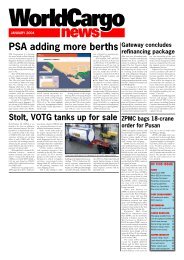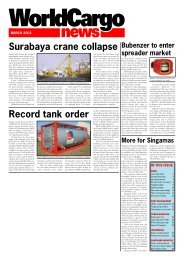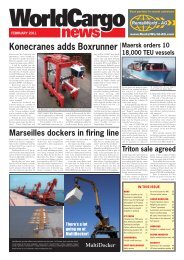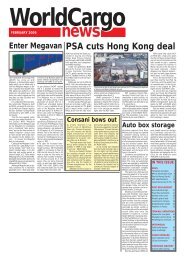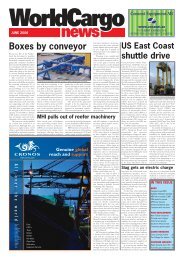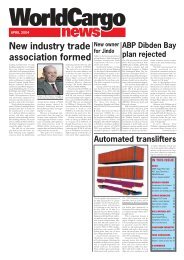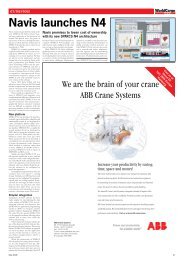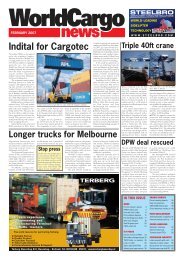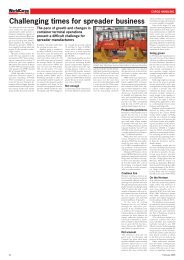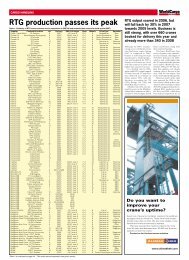WCN Dec Front page - WorldCargo News Online
WCN Dec Front page - WorldCargo News Online
WCN Dec Front page - WorldCargo News Online
You also want an ePaper? Increase the reach of your titles
YUMPU automatically turns print PDFs into web optimized ePapers that Google loves.
<strong>WorldCargo</strong>newsCONTAINER INDUSTRYcarried out by Absortech into themechanics of water absorption byits desiccants over lengthy periods.The efficiency of the basicAbsorpole has been studied byusing Alfasensor Moisture IndicationStrips, which can be positionedthroughout the containerto give a clear reading of the waymoisture levels change throughouta typical voyage and so helppinpoint potential problems.Absortech can supply theAlfasensor strip through its distributionnetwork and suggests itis used routinely as part of a shipper’scontinuing QA programme.The company is now also makingits unique AbsorCalc softwarecommercially available for thefirst time. This enables end-usersto simulate various ambient voyageconditions, and measure theeffect of introducing differentamounts of desiccant into thecontainer, without actually testingreal cargo. Further refinementsare planned for this system,to enable changes in packagingand cargo characteristics to bestudied as well.The company sums up its recentapproach by underlining thatdesiccant requirement usually variesmarkedly between each application,and that the “one size fitsall” principle does not readily apply.Instead, Asbortech is nowcommitted to creating a range ofdesiccant and supporting productssuited for as wide an applicationas possible. The manufacture ofmost products is still carried outin Sweden, with some manufactureof Absorbag in Indonesia forthe Asian market.The automated productionprocess in Sloinge (Sweden) is currentlybeing doubled in size, tokeep pace with demand, with thenew Absortop manufacturing linecurrently under construction. Atthe same time, Absortech has furtherexpanded its global distributionnetwork and is now representedin over 25 countries.Far East fortunesOne other producer of the poletypedesiccant is Super Dry International,headquartered in Singaporeand Indonesia, which hasbeen active since 2000. The companymanufactures its V2 desiccanttrap mainly in Indonesia, and hasrecently planned a second facilityin Vietnam.The V2 utilises a 1kg chargeof calcium chloride, which is ableto absorb moisture equivalent to150 per cent of its original dryweight. The resulting solution istrapped in a 2 litre reservoir, comprisinga triple skin assembly.The company has also morerecently introduced a smaller sachetversion, known as Dry Sac,for incorporation into cargo packagingor hanging garments. TheDry Sac is available in sizes fromjust a few grammes to 500g. SuperDry reports strong growth indemand for its various desiccantproducts throughout Asia.In the bagAs indicated earlier, Denmark ishome to one of the most establishedproducers of container desiccants,Anders Bendt, which continuesto market its proven Dry-Bag range worldwide. All productionis still carried out at the company’smain facility at Aarhus.The latest generation, Dry-BagIII, has recently been introducedand is being targeted at end usersrequiring small-scale amounts ofdesiccant. It follows the earlierlaunch of Dry-Bag II in 2001,which utilises a Tyvek packagingand is totally dust proof. Dry-BagII is available in all sizes from 25gto 2kg, with built-in lanyards foreasier positioning, and the 500g and1kg versions have proved popularwith producers/shippers of machineryand electronic goods.Another variation is the company’sHang-Bag, which was developedseveral years back as a lowcosting and easy-to-apply versionof the Dry-Bag. This is suited forprotecting bulk cargoes, such ascoffee and cocoa beans, as it canbe attached to the container roofand positioned above the load.The entire Anders Bendt rangeuses a naturally occurring molarclay, which has been its staple desiccantmaterial for over 20 yearsand is claimed by the firm to bemore environmentally friendlythan chemical desiccants of thecalcium chloride type. It is completelynon-toxic and can be disposedof as normal householdwaste. It is also claimed to be less“aggressive” than chemical versionsto cargoes such as foodstuffs.Upwards of four 2kg bags ofthe standard Dry-Bag are requiredfor a typical 20ft box application.Each bag can absorb up to 76 percent of its dry weight over a longperiod, and none will drip evenwhen totally saturated.Anders Bendt further statesthat, in comparison to the growingrange of water-absorbingpoles, the Dry-Bag remains farsimpler and more cost-effective touse. The bags can be fitted orplaced into any void space withinthe container and are not just confinedto the corrugation recesses.On the limitLevosil, based in Italy, is anothersupplier of container desiccantsmade largely from naturally occurringminerals. It has limited thecalcium chloride content of itsContainer Dry product to below20 per cent and so avoided theneed to label it as an irritant whensold in Europe, as required by EUregulations introduced in 1999.Annual sales of Container Dryare continuing to grow, with theSüd-Chemie’s Container Dri II eliminates moisture damage on canned goodsmajority concerning bags of astandard 1kg size. Tests carried outrecently by Levosil indicate thateach bag of this size will absorbup to 550g of water vapour, whenexposed to 80 per cent relativehumidity at 25degC. It is recommendedthat, for deepsea transport,one bag is used for each 1ftlength in the container, ie a totalof 20 per 20ft and 40 per 40ft.Stripped for actionSüd-Chemie Performance Packaginghas long been one of thelargest producers of desiccants inthe US, if not globally, for containertransport applications. Salesof its Container Dri II are continuingto grow strongly, with the“strip” version, introduced twoyears ago, gaining rapidly inpopularity.Süd-Chemie marketing managerMark Florez said that the rangeof products protected is increasingwith each year, with just about alltypes of commodity, including steel,canned and timber products, nowtested with the desiccant. He explainedthat Container Dri II comprisesa formulation of natural mineraland chemical substances thathave a capability of absorbing moistureequivalent to almost threetimes their dry weight to form athick gel.The desiccant can stay activefor a maximum of 60 days and iscontained in a Tyvek film bag, fittedwith adhesive backing for securingto the inside of the containerwall. The Container Dri IIStrip features six 125g bags affixedto a single backing sheet, whichfits snugly between the corrugationsof the container sidewall.Around 5-6 of these strips aretypically required per 20ft unit.In addition to simplifying thewhole installation procedure, theuse of these strips also better distributesthe desiccant through thecontainer and so helps improve itsperformance.Well establishedAnother US supplier, Desiccare Inc,continues to produce its well establishedCargo DryPak containerdesiccant. The latter, which similarlyuses a base material of calcinedclay, remains active for over 50 daysand can absorb moisture greaterthan its entire dry weight. It alsocomes in a Tyvek bag and is availablein 500g-1.5kg sizes.In the US, Cargo DryPak ismarketed by Dry Pak Industries,which was founded in 2002 byformer personnel from Dessicareand has since greatly expanded itsrole as a consultant to shippers ofsensitive high-value commodities.In India, Cargo DryPak is currentlybeing marketed/soldthrough Swambe Chemicals (locatedin Gujarat State) and its sisterfirm, Sorbead India. Swambe hasbeen manufacturing silica gel andother types of industrial desiccantsince the early 1970s and is todayincreasingly targeting its productsat logistics and transport end-users.The company states that containersshipped from ports in India canexperience some of the largestchanges in internal temperature andrelative humidity found anywherein the world, with the former varyingby as much as 50degC and thelatter falling from around 95 percent to just 15 per cent during a20-40 day voyage to more temperatezones. As such, there is paramountneed to make local exporters/importersmore aware of theavailability of custom-made desiccants,such as Cargo DryPak, andadvise them on their proper use.Heading northContainer shipments from SouthAfrica are similarly prone to largechanges in their ambient condition,because most move onnorthbound routes and thus crossthe equator. Local firm, Stopak PtyLtd, has been producing its ownbrand of container desiccant inCape Town since 1996. In addition,the company offers a completerange of silica gels and humidityindicator cards.Stopak was prompted to startits own manufacture, when therequisite raw materials were foundto be available in abundance locally.It had previously importeddesiccants to supply the local exportmarket, but found them tobe of variable quality.Stopak currently producestwo basic desiccant types. ProDriis made from high performancecalcinated clay activated with calciumchloride and can absorbover 50 per cent of its dry weightin water at 30degC in 80 per centrelative humidity. It is being targetedat those container shipmentsexposed to more extremeconditions.ClayDri comprises dried bentoniteclay and is thus chemicallyinert and harmless. The productcan be supplied in Tyvek or kraftpackaging, and meets US specificationMIL-D-3464E. One unitof this desiccant (typically 30-40g)will absorb over 6ml of water at40 per cent relative humidity (at25degC).Stopak has also established itsown consulting arm and liaisesclosely with end-users in an effortto enhance design and further reducecosts. Its bagged containerdesiccants are now fitted as standardwith a clip-on hook to facilitateeasy installation, while they areguaranteed not to leak once saturated.Delivery to end-users hasbeen optimised by packing/supplyingthe desiccant in 20 tonne container-lots.Amongst prominentusers of Stopack desiccants are theFMCG Group, Proctor and Gamble,Hewlett Packard, Volkswagenand Coca Cola.Stopak desiccants are exportedto Europe, the Americas, the MiddleEast/Africa, South East Asiaand Australasia. Marketing for theAustralian region is now handledby JMP Holdings, which is anothercompany to report increasinginterest from shippers. JMPmarkets desiccants from Stopak, inconjunction with dunnage bagsfrom the South African supplier,and has gained recent businessfrom local wine and steel producersand paper and flour mills. Theoffering of custom-made dunnagefurther aids the combat againstinternal condensation as it replacestimber packaging, which is oftena big source of trapped moisture.Stopak’s ProDri desiccant hasattracted particular attention, asJMP’s own tests have revealed anability to absorb up to 80 per centof its dry weight in water. By comparison,the more traditional silicagel achieved just 30-40 per cent.Chinese inroadsAs mentioned earlier, China is alsostepping up its involvement in themanufacture of industrial desiccants,with a number of companiesnow offering their own formulationsto the booming localexport container market and increasinglyto customers overseas.Zhongyuan Co is located closeto Guangzhou and has recently introducedthe “Welldry” containerdesiccant, which features montmorilloniteclay as its main constituent.This forms part of a largerspread of over 200 different desiccantproducts, which are designedfor industrial end-use andmade from dried clay, silica gel,calcium oxide or activated carbon.Zhongyuan’s container desiccantcomes in three bag sizes -250g, 500g and 1kg - and is capableof absorbing water up to 70per cent of its dry weight. It alsostays active for periods of morethan 45 days and is completelynon-toxic. A number of bag materialsare available, ranging fromspun-bonded Tyvek and high densitypolyethylene to heat-sealedand coated kraft papers.Ru Shan Dayang Silica Gel, asits name indicates, is continuingto focus on the manufacture ofsilica gel and has also traditionallyfocused on the domestic market.However, it has more recently establishedrelationships with tradersin the US, Japan, Taiwan andHong Kong, and is currently applyingfor ISO 9002 accreditationto further enhance its standinginternationally.The company is located inShandong Province, close to Yantai,and has been in production for almost20 years. It currently employsover 300 workers, producing over7,000 tonnes of desiccant per year,and works in cooperation with localresearch company, SichuanTianyi Science Co.The Dayang silica gel containerdesiccant is available in twosizes, 100g (SG19-100) and 125g(SG19-125), and can be bagged ina wide range of materials, includingplastic film, composite paperor adhesive-backed fabrics. Thecompany recommends that up to40 x 100g bags (or 32 x 125g)should be used per 20ft container,with these amounts doubled for a40ft unit.Despite the fact that silica gelis no longer selected for the majorityof container desiccant applications,Ru Shan Dayang hascarried out independent tests andclaims that its product will workwell provided the change in ambientis not too great. For largerswings in ambient (greater than15degC), it advises that a largeramount of desiccant should beused. ❏28<strong>Dec</strong>ember 2003



